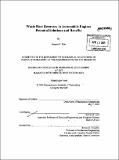Waste heat recovery in automobile engines : potential solutions and benefits
Author(s)
Ruiz, Joaquin G., 1981-
DownloadFull printable version (1.837Mb)
Other Contributors
Massachusetts Institute of Technology. Dept. of Mechanical Engineering.
Advisor
Steven B. Leeb.
Terms of use
Metadata
Show full item recordAbstract
Less than 30% of the energy in a gallon of gasoline reaches the wheels of a typical car; most of the remaining energy is lost as heat. Since most of the energy consumed by an internal combustion engine is wasted, capturing much of that wasted energy can provide a large increase in energy efficiency. For example, a typical engine producing 100 kilowatts of driveshaft power expels 68 kilowatts of heat energy through the radiator and 136 kilowatts through the exhaust. The possibilities of where and how to capture this lost energy are examined in this paper. The solution of recovering heat energy from the exhaust through the catalytic converter with a Stirling engine was examined due to its practicality. A novel approach for combining a Stirling engine and a catalytic converter that would be effective was designed. The power output and efficiency of the Stirling Engine were analyzed and it was found that the average overall car efficiency could be raised 7% with the new design.
Description
Thesis (S.B.)--Massachusetts Institute of Technology, Dept. of Mechanical Engineering, 2005. Includes bibliographical references (leaves 32-33).
Date issued
2005Department
Massachusetts Institute of Technology. Department of Mechanical EngineeringPublisher
Massachusetts Institute of Technology
Keywords
Mechanical Engineering.